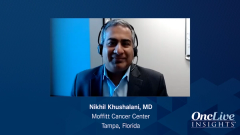
BRAF/MEK Dual Inhibitors for Melanoma
An expert panel analyzes BRAF/MEK dual inhibitor therapy for the treatment of melanoma.
Episodes in this series

Transcript:
Sunandana Chandra, MD, MS: Based on the DREAMseq data, Dr Khushalani, let’s say you decided to treat a patient with combination immunotherapy [IO] and they progress. Depending on their progression, is going to a BRAF/MEK dual-targeted therapy approach your automatic default in the second line?
Nikhil Khushalani, MD: That’s a great clinical question. It depends. If you’re following the DREAMseq sequence, that tells me we’ve utilized ipilimumab and nivolumab, so anti–PD-1 plus anti–CTLA-4 in the frontline setting. As we know, the response rate there, based on 2 trials, has essentially been between 46% and 55% depending on which numbers you specifically look at.
In the second-line setting, if this patient is BRAF-mutated and I don’t have a clinical trial available, I would certainly consider MAP-kinase targeted therapy for these patients because these patients almost invariably tend to progress fairly quickly, so it would be very appropriate to get their disease under control. I think now there are more data emerging that going to another line of immunotherapy following failure of frontline combination IO therapy, we really don’t have a good second-line IO option. If one looks at the recently published data on nivolumab plus relatlimab in the refractory setting, this was in the Journal of Clinical Oncology and had been presented in abstract form previously, the response rate to the nivolumab, relatlimab combination in the refractory setting is only 12%. That is unfortunately very disappointing.
I think one of the burning questions in our minds now is, what is the optimal frontline immunotherapy option? We know that IO is likely better than targeted therapy. As Dr Pavlick elegantly mentioned, there is that subpopulation of patients for whom we absolutely have to give targeted therapy first because of the rapidity of their disease, the kinetics of response. You need to first get that under control before adding immunotherapy. There are data to support that approach as well. I’ve used that in clinical practice through the SECOMBIT trial, giving up to 8 weeks of targeted therapy and then electively switching to combination immunotherapy if appropriate for that patient. There are a few patients in my practice who have been on targeted therapy for over 5 years and still are doing very well. But it’s hard to truly discern who those patients [will be], although many trials have attempted to do that in retrospect, looking at data as post hoc analysis.
Specifically to answer your question, ipilimumab/nivolumab would certainly be considered in the front line. I still am a believer that one could still use single-agent anti–PD-1 monotherapy for patients because recall, none of the combination agents in IO have demonstrated statistical superiority to anti–PD-1 monotherapy in a prospective trial. They’ve definitely improved progression-free survival. But the question that always begs answering is, can you give these drugs sequentially? Can you start with anti–PD-1 monotherapy and give them combination anti–PD-1, anti–CTLA-4 when they become refractory? We now have 2 trials that have aimed to answer that question as well, and in that setting the response rate to combination [therapy] is about 30%.
Another thing I think will hopefully come to fruition as standard of care would be adoptive cellular therapy with tumor-infiltrating lymphocytes [TILs]. That is already being adopted in some [European] countries as standard of care after failure of frontline immunotherapy based on the trial of TIL vs standard of care second-line treatment, demonstrating superiority for TIL. This is being reviewed by the US FDA right now, and we will eventually come to know whether this becomes approved for standard of care for anti–PD-1 refractory patients.
Transcript edited for clarity.








































